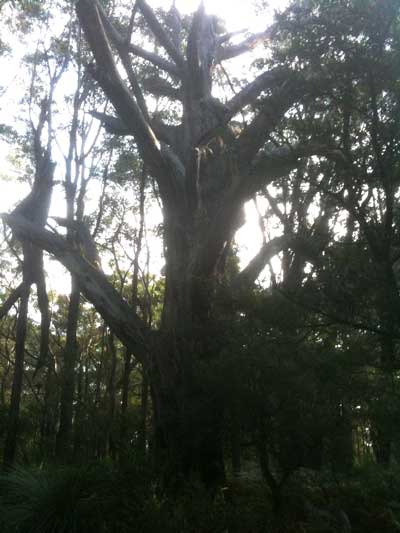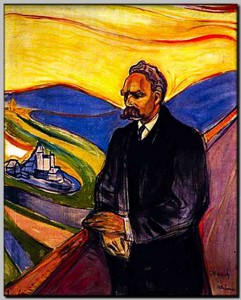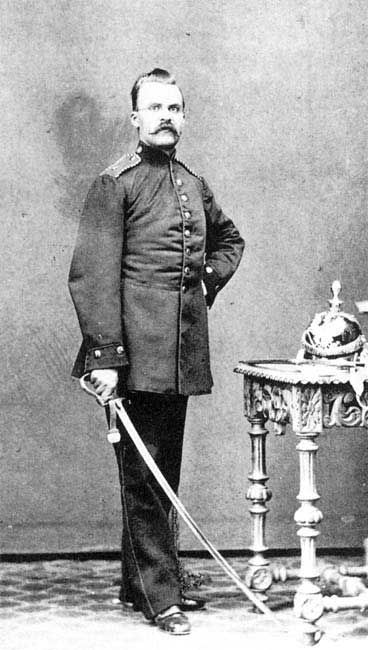 Donovan and I celebrated a truly marvellous Thorrablot yesterday. One of the most brilliant ritual experiences I’ve ever had – we’re on such a strong shared wavelength and what an honour it is to know him.
Donovan and I celebrated a truly marvellous Thorrablot yesterday. One of the most brilliant ritual experiences I’ve ever had – we’re on such a strong shared wavelength and what an honour it is to know him.
I arose early. I packed a delicious organic lunch of red beans in pasta/tomato sauce, chopped carrot, almonds, and sauerkraut. We ended up mixing these together with surprisingly delicious results when lunch time arrived.
I drove out to Donovan’s place. That morning, suddenly inspired, he had made a beautifully carved Mjolnir from wood, a hefty hammer, an offering for us to give. Armed with mead and drinking horn, we drove to a National Park by the sea.
We spent the drive talking about our hopes, desires, lives, people we know; about our creative, health, spiritual, hobby, and financial goals.
We walked for an hour or more through exquisite forest, over dizzying ocean cliffs, the sea vast and majestic, the trees all wise and all wit.
We came to our secret location, a gigantic flat rock which perches, secluded and stolidly precarious, on the cliff face, overlooking vast ocean vistas. How to find this rock? The almost-hidden trail is marked from the main path by two trees which, if seen from the correct angle, one behind the other, form an Elhaz stave shape. Elhaz: perhaps it invokes the sacred space which is open and closed all at once.
We meditated, bare feet; let the distant, epic sea song wash away our petty conscious thoughts. We knew what we wanted this ritual to be from our conversations in car and forest. To invite Thor to help us renew the momentum of spirit in our lives, to drive out the frosty barbs of negativity and boredom and renew the membrane of magic. We let this hope flow through our beings, through the rocks, the trees, the clouds, the sea.
When it felt right the ritual began, in such a way that we scarcely even noticed that we were in it. We joked and played, laughing (with compassion) about the stiffness and artificiality that some folk fall into on ceremonial occasions – so anxious to get it “right” that they cramp up and lose the spirit of the thing. Not us; we called and hollered, half serious, half in parody, but we could feel that our deities were warmly inclined to our spirit of joy.
I sang and screeched and howled and Donovan roared. We told snappy tales about Thor’s many fine qualities, of his travelling companions, of our desire to uncover the magic in our lives that makes us joyous even amid the imperfect drudgery that seems always ready to swamp our days.
Three brilliant phrases emerged as we seethed and celebrated.
 Wyrd trumps Will
Wyrd trumps Will
This gem came to me in my meditation. I have in the past (and well after I should have known better) had this idea that if I fill myself with enough magic then with my power-bloated ego I can blast the hard things in my life into halcyon dream-perfection. Clearly a notion that can lead to disappointment!
What crystallised as I meditated was something I’ve explored several times recently with brilliant people in my life – that we don’t get to live a richly magical, spirited life only after we’ve cleared away all the sources of drudge and struggle.
No, the best way is to call on the magic in the midst of life’s hard work, to have the courage and creativity and humour to find magic even amidst the awesome mundanity of dealing with the ignorant, foolish, and petty (at some level that means all of us); in dealing with the unrelenting challenges of work and money and stale repetition and I-never-have-enough-time.
So go with wyrd, don’t try to fill your will up with numinous force, you’ll just waste it in exhausting struggle. Instead work with wind, tide, and wit. Cut with the grain, dance when you are tempted to stomp grumpily. Empty yourself and you cannot be drained – be a conduit, there’s an endless supply of magic that just desperately wants to be tapped into idiosyncratic human channels. It might or might not produce what you think you need, but there is a good chance it will produce what you actually need. Let yourself be curious. Radically curious. Let yourself be bewildered and surprised.
Then in our ritual playfulness a second phrase emerged.
Invoke with Laughter
Chaos magicians tend to think that laughter is the best way to banish magical moments, spirits, spells, states of mind, anything. Yet in certain senses (not all) this could actually be a very dry, grey, boring, ugly idea. Could it potentially imply that magic has to be pompous, serious, over-stuffed, strained, redundantly effortful – in a word, insincere, in a word, dishonest – in order to be summoned? What an awful notion seems to potentially coil implicit in the notion of banish with laughter!
We, on the other hand, we invoked with laughter. We joked about ourselves, people we know, about our gods, and they joked with us and on us, and it was exquisite. Cascading joy flooded the mounting force of our ritual, which had no distinct beginning but just came into tide when it wanted, as we gave it space to do so (a nice example of wyrd trumps will in action). And Thor is one of the most mirthful figures I can think of, a truly joyous force in the world: who better to call with hilarity?
We talked about Thurisaz, its recent recurring wyrd appearances in Donovan’s life. We agreed that we like this rune, with its scary reputation and its heart of gold. Thurisaz is like Hagalaz or Nauthiz – it invites a reality check and people are afraid of that and avoid – to their cost, or more accurately, to their loss.
And Laguz kept appearing in syncronicitous ways throughout the day, the sea rune, the rune of hidden riches and mystery! Of terror, and fury, and utter confusion, and yet also of “silk and gold and reveries of graciousness” (Nietzsche).
And goats! Thor has a close connection to goats. We celebrated how knowing, collected, assured, adaptable, tricky, durable, flexible, and just plain weird goats are. Nobody messes with Goat. Goat is low key. Goat doesn’t gab his mouth when he should be silent. Goat doesn’t give away his full abilities, doesn’t show his hand out of narcissism or insecurity. Goat keeps it real. Goat is permanently, impeccably unflappable. Goat keeps the magic of its membrane in flourishing order. Goat knows that horns are to be worn, not goofily tooted. What a truly awesome role model.
Ritual, not Routine
Then the third phrase came, and it was a verbal crack of thunder as it sprang from Donovan’s lips: Ritual, not Routine. Yes! Let’s not have lives of routine: numb, stupid, clanking, ornery, dogmatic. Repetition can also be playful, flowing, artful, even creative. It can have rhythm and flow and wit. We can move through all the “must do this” tasks of life with hang-dog heads, or with halos of fire and supple limbs (in a casual/subtle/low key way if you want of course).
It’s all in how you let yourself attach meaning to the things that unfold. Change the meaning, change yourself…well, who knows what sort of brilliant consequences that might have (you might not even notice them)?
Ritual, not Routine applies literally to the art of doing ritual observance – and we were doing ritual, not empty rote motions! It was sacred play. And this goes beyond into all of life. The whole of life is potentially a ritual: improvised, filled with joy, serendipity, learning, healing, growth, courage, and patience in the face of challenge. We forget this at our peril, falling into the factory farm of our own dullness. Yet it takes so little to stay – in the dance, in the joyous.
“Love life” is not an item to be checked off on some to-do list, some roster of accomplishments. And it has nothing to do with the arbitrary turning of events. In this we aligned ourselves with a tradition that stretches from Lao Tzu (and earlier) to Cicero and even to Nietzsche, yet without any self-consciousness or reflective pomposity: that to love this life is wonder, is its own reward, is nourishment complete. That we find love for life when we give love, not when we churlishly try to force life into the shape that we ignorantly think is best for us. After all, in an infinitely complex universe, who can really be sure of what is best for them anyway?
And to those who disapprove of our light feet: perhaps you need a dose of Nietzsche’s fröhliche wissenschaft, his gay science, his dancing seriousness and courageous frivolity. Being ponderous and heavy has nothing to do with being profound. Let yourself embrace the vulnerability and power of dedication and play admixed!
 We drank toasts of delicious mead, charged with lashings of chanted Thurisaz runes. We laughed and prayed and affirmed and quaffed. We drenched the hammer and offered it up, our sacrifice. We splashed mead on rock, tree, sky, sea, cloud, every hidden delight of that sacred place. We offered our gratitude liberally.
We drank toasts of delicious mead, charged with lashings of chanted Thurisaz runes. We laughed and prayed and affirmed and quaffed. We drenched the hammer and offered it up, our sacrifice. We splashed mead on rock, tree, sky, sea, cloud, every hidden delight of that sacred place. We offered our gratitude liberally.
We ate our lunch happily. We talked to spirits of stone and wood on our walk back through the forest, the mead sending us into buoyant clairvoyance and exuberant inspiration.
We talked and ate into the night, and sang, and played music, and warmed ourselves in the glow of family and dogs and the full moon, and laughed at the limp literalism that sometimes haunts folk that call themselves Heathens, and marvelled at the privilege we’ve been given to flow so easily into the spirit of things (and vice versa).
And I have to re-emphasise – nothing said here takes away the reality of the challenge and difficulty that life presents. If we try to force spirituality into being a magic bullet for the ease of our burdens then chances are good it will not long tolerate our presumptuousness, our pandering to our ego’s fear of suffering (which is not a trivial thing, but nonetheless which need not be made the maxim of our actions).
The trick might be to get beyond the mole-vision of bean-counting one’s entire life into allotments of effort (lots) and ease (never enough). There is no guarantee that any of us will see out our journey in the way we’d consciously most prefer, but with our eyes fixed on the horizon (and not on our feet) our chances are that much improved, and the toil of the path might be somewhat lessened (and if not then so be it – we are here to learn, so let’s not miss whatever opportunities we are given).
All such caveats aside, I want to express my profound gratitude for these fine gifts, these three principles of religious/magical/cultural practice…and for living life, too:
Wyrd trumps Will
Invoke with Laughter
Ritual, not Routine
I pray I remember, and keep living out my remembrance, of these terrible, wonderful thoughts.
Hail Thor!

